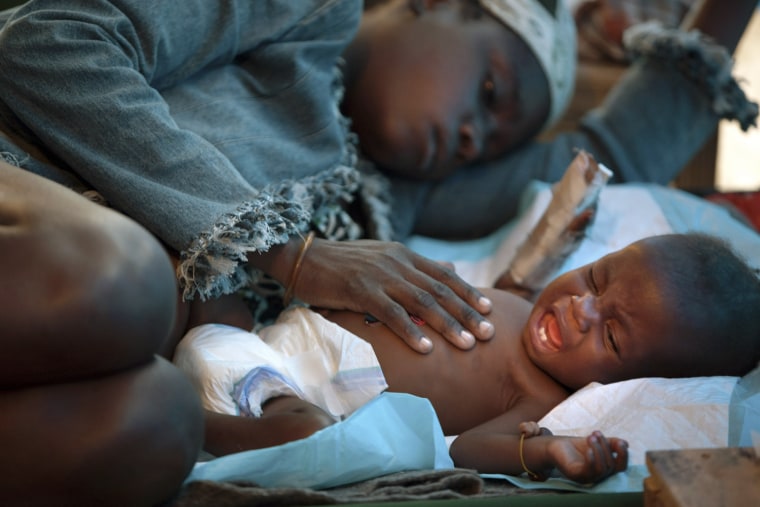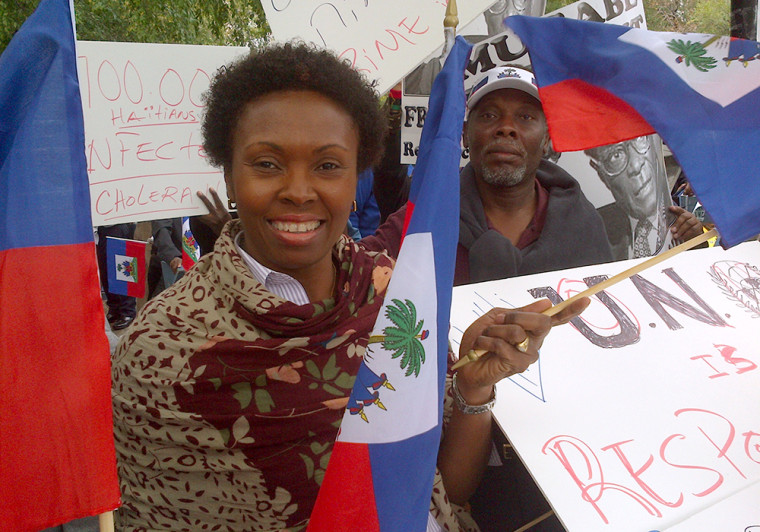
NEW YORK -- Haitian protesters gathered outside U.N. headquarters Thursday to demand that the international body admit its role in the worst outbreak of cholera in modern history and provide compensation, but experts said the protesters may find it hard to hold the U.N. accountable.
"The victims have to be compensated for what they went through," said Marjorie Gaston, a 49-year-old Haitian-American from New York, as representatives from 193 member states met inside during the U.N.'s annual General Assembly. "There is responsibility here, not just morally but financially."
More than 650,000 Haitians have come down with cholera in the past three years, and more than 8,500 people have died in an epidemic that scientists have traced to leaking sewage at a camp established by Nepalese peacekeepers. A Boston-based human rights group called the Institute for Justice and Democracy in Haiti, which has already tried to file a claim against the U.N. once, is now preparing lawsuits against the U.N. in both Haiti and the U.S. demanding restitution for the victims.
But in response the U.N. has invoked a sweeping immunity from nearly all legal claims that dates back to its founding, and experts in international law say that this legal shield has proved almost impenetrable over the past seven decades.
In 1946, the year of its first General Assembly, the U.N. granted itself legal immunity as one of its first official acts. Member states signed a ratifying treaty, and that immunity has been endorsed separately by laws passed in many member states.
"You can't sue the United Nations in a domestic court or any court because governments have signed the treaty and some countries like the U.S. have even put it in domestic legislation," explained Larry Johnson, a former U.N. official who teaches international law at Columbia Law School. "People have tried in various jurisdictions but their cases have been thrown out because it's against the treaty and in some cases against domestic law."
According to Johnson, top U.N. officials have a full immunity from prosecution and litigation akin to that of any diplomat. Lower level U.N. representatives, like peacekeepers, have immunity for tasks performed as part of their jobs.

After the massacre of 8,000 Muslims by Serbian forces in Bosnia in 1995, a group of women called the Mothers of Srebenica tried to sue the U.N., alleging that Dutch UN peacekeepers didn't do enough to prevent the killing. Both Dutch courts and the European Court of Human Rights rejected the suit, sustaining the U.N.'s immunity, even though the Dutch government was found liable in a separate case.
But according to Alex Whiting, a Harvard Law professor currently on leave to work as Prosecution Coordinator at the International Criminal Court in the Netherlands, immunity "does not mean the U.N. ignores all claims of wrongdoing."
"What happens is there are typically alternative mechanisms for resolving disputes," said Whiting. "If a U.N. member commits a tort, the U.N. will typically agree to some sort of settlement process to resolve it for the victim."
In 1965, for example, U.N. peacekeepers in the Congo were accused of damaging properties and injuring people. They submitted claims to the U.N., and the U.N. settled some of the claims.
To date, the U.N. has not indicated a willingness to settle claims in Haiti, though most scientific studies have traced the cholera outbreak to U.N. actions.
After the Haitian earthquake of 2010, a new contingent of U.N. peacekeepers from Nepal came to live in an existing camp near a tributary of the Artibonite river. Within weeks, locals began developing cholera, a disease that hadn't been seen inside the Caribbean country's borders in the past two centuries. Three years later, new cases are still being reported, and the disease has spread to the Dominican Republic, Cuba and Venezuela.
Numerous scientific studies have determined that the strain of cholera circulating in Haiti is similar to cholera found in Nepal, and say evidence suggests it was introduced by the peacekeepers, who allowed the sewage from their camp to flow into the river.
"Our findings strongly suggest that contamination of the Artibonite and one of its tributaries downstream from a military camp triggered the epidemic," said a report published in a journal edited by the Centers for Disease Control in 2011. "There was an exact correlation in time and places between the arrival of a Nepalese battalion from an area experiencing a cholera outbreak and the appearance of the first cases in Meille a few days after."
The Haitian public blames the peacekeepers for the disease, and has protested against the continuing presence of both the peacekeepers and U.N. police, whose combined forces total more than 10,000. The Haitian legislature has asked the peacekeepers to leave.
The U.N., however, has refused to accept blame for the epidemic. A 2011 report commissioned by the U.N. confirmed that evidence pointed to the peacekeepers, but concluded that a "confluence of circumstances" had caused the outbreak. Secretary General Ban Ki-Moon said at the time that the results of the scientific studies were not definitive.
When the Institute for Justice and Democracy in Haiti filed a claim with the U.N. on behalf of 5,000 Haitian cholera victims in 2011, he invoked the U.N.'s time-honored legal immunity to explain why no money would be forthcoming.
Instead of paying claims to victims, the Secretary General announced a drive to raise hundreds of millions of dollars to fight cholera in Haiti.
In July, the members of the U.N.'s cholera panel -- no longer working for the U.N. -- updated their earlier assessment. They said that the accumulated evidence now pointed to the peacekeepers as the source of the cholera. The UN has not issued a formal response.
In August, responding to an editorial in the Washington Post that urged the U.N. to "right a wrong," Moon's spokesman said that the UN needed help to fight cholera, and asked for money.
"Since the onset of the epidemic, we have been on the ground every day responding to alerts of new cases, supporting medical care for victims, rehabilitating cholera-treatment centers, disinfecting health facilities, treating sewage, training health workers and providing much-needed medicines and vaccinations," wrote Martin Nesirky. "This work goes with our longer-term efforts on improving water and sanitation infrastructure."
Nesirky said that only half of the $444 million needed for the next two years had been raised. Wrote Nesirky, "The hurricane season is looming. Donors need to step up." He did not address the editorial's contention that peacekeepers had caused the outbreak.
Nesirky did not immediately respond to a request for comment on the U.N.'s current position on the origins of the epidemic.
Outside the U.N. on Thursday, a lawyer for the IJDH said the group still planned to press forward with its lawsuits despite the legal obstacles. "We know what the challenges to jurisdiction are," said Brian Concannon, "but we're confident that this case can overcome them."
More from NBC News Investigations: